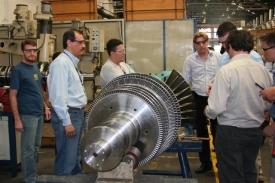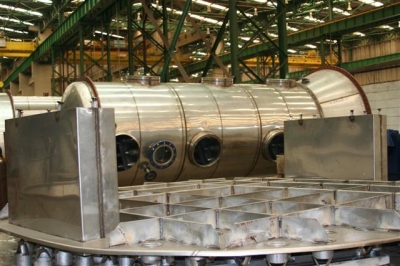Filed by Steve Ritter
One of the most striking achievements of Brazil’s biofuels industry is the vision of scientists, government officials, business leaders, and educators to work together to develop an integrated approach for future growth.
For example, agronomists are working to prepare new plant cultivars that produce more oil or more sugar through selective breeding and genetic modification. These scientists are  also working to adapt some of Brazil’s many species of plants that typically have not been used in agriculture. Soil scientists are conducting research to ensure that the country’s increase in agricultural production doesn’t destroy the fragile soil ecology. The reddish soil is rich for growing crops (right), but the high mineral content needs to be balanced with organic carbon. Thus, no-till planting techniques that return plant residues to the soil are being encouraged.
also working to adapt some of Brazil’s many species of plants that typically have not been used in agriculture. Soil scientists are conducting research to ensure that the country’s increase in agricultural production doesn’t destroy the fragile soil ecology. The reddish soil is rich for growing crops (right), but the high mineral content needs to be balanced with organic carbon. Thus, no-till planting techniques that return plant residues to the soil are being encouraged.
As we witnessed in our explorations of bioethanol and biodiesel plants this past week, companies are squeezing out every possible drop of energy from sugarcane, beef production, and soybeans and other crops to produce fuels, feed, and fiber.
Before we head to the resort town of Águas de Lindóia for the two-day symposium that will end our Brazilian adventure, two last stops are NG Metalúrgica and Dedini Indústrias de Base, both located in Piracicaba. These companies build the machinery, chemical reactors, distillation columns, and electricity generators that go into bioethanol and biodiesel factories. Most people might not think about this sector of the biofuels industry, but the Brazilians have, and they consider improving engineering just as important as any other piece of the biofuels puzzle.
 NG, with about 1,000 employees, is running at full capacity, noted Fausto Schmidt, an applications engineer who gave us an overview and tour of the workshops. The company designs and builds steam turbines (right) to power bioethanol plants, as well as large distillation columns—a column in the process of being assembled is shown below.
NG, with about 1,000 employees, is running at full capacity, noted Fausto Schmidt, an applications engineer who gave us an overview and tour of the workshops. The company designs and builds steam turbines (right) to power bioethanol plants, as well as large distillation columns—a column in the process of being assembled is shown below.

The company’s sales are expected to hit $150 million this year, Schmidt said. The company has its equipment installed in many countries around the world, with major contracts in South America and Southeast Asia. It has installed turnkey ethanol plants—complete systems ready to operate—at a few sites in the U.S.
Dedini likewise places an emphasis on biofuels and is working full-tilt to supply boilers, distillation equipment, and turnkey systems. The company has grown from about 2,300 employees in 2000 to about 4,600 employees today, noted chemical engineer Hélio G. Filho, who briefed our group on the company’s activities.
“We are a factory that makes factories, with an emphasis on biofuels,” Filho said. About 50% of Dedini’s business is in sugar refining and alcohol production, but the company also builds systems for biodiesel, breweries, pulp and paper, and wastewater treatment.
The enthusiasm of Schmidt and Filho is common these days in Brazil as the country lives the “triple revolution” of bioelectricity, bioethanol, and biodiesel.
We are interested purchasing an ethanol plant for the Bahamas. Private Investors. Please give an estimated price to have a turn key system set up made, including alcohol imports to make approvimately 50 million gallons per year.
We are also interested to know the price to just import the ethonol in a completted state to see if it’s worth it to purchase the plant or just import finished product directly.
Thank you
Jennifer Stubbs
Hi:
Try contacting the companies mentioned by checking out their website. They should be able to quote you some prices or steer you in the right direction.
we are creating a co-op in Florida for sugar. What’s the equipment needed and approximate cost to get the sugar from cane to the form (what is the form?) needed for an ethanol plant? we’ve got the farming part down just could use some direction on preparation for use in an ethanol plant rather than refined sugar.